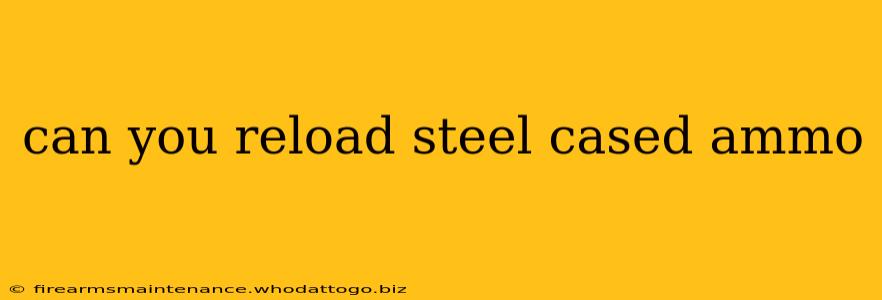Can You Reload Steel-Cased Ammo? The Complex Answer
The short answer is: it's complicated, and generally not recommended. While technically possible in some cases, reloading steel-cased ammunition presents significant challenges and risks that often outweigh the potential benefits. Let's delve into the specifics.
The Challenges of Reloading Steel Cases
Several factors make reloading steel cases significantly more difficult and potentially dangerous than reloading brass cases:
-
Case Hardness: Steel cases are significantly harder than brass. This hardness makes them more resistant to resizing, potentially leading to case splitting or cracking during the reloading process. The increased hardness also puts more stress on your reloading equipment.
-
Case Neck Hardness and Brittleness: The case neck, the crucial part that holds the bullet, is particularly problematic. The hardness of the steel neck can cause it to work-harden quickly, leading to cracking or failure after only a few reloads. This significantly reduces the number of times a steel case can be reloaded, diminishing any cost savings.
-
Corrosion Resistance: While steel cases are often touted for their corrosion resistance, this characteristic can also hinder the reloading process. The same properties that make them resistant to rust also make them more difficult to clean and prepare for reloading. Residual fouling can negatively impact reloading accuracy and case life.
-
Primer Pocket Inconsistencies: Primer pockets in steel cases can vary in size and shape more than in brass cases. This inconsistency can lead to difficulties seating primers correctly, potentially resulting in misfires or dangerous malfunctions.
-
Equipment Compatibility: Not all reloading equipment is designed to handle the hardness of steel cases. Using unsuitable equipment can damage your press, dies, or even cause injuries.
When (and Why) You Might Consider Reloading Steel Cases (Proceed with Extreme Caution)
Despite the challenges, some reloaders might consider steel case reloading in very specific situations:
-
Cost Savings (with caveats): If steel-cased ammunition is significantly cheaper in your area, reloading might offer marginal cost savings if you can successfully reload them a few times and avoid significant equipment damage or loss of ammo. The savings are generally minimal unless you’re working with very large volumes.
-
Specific Cartridge Availability: In situations where a particular cartridge is only available in steel-cased ammunition, reloading might be the only option to acquire that specific type of round. However, this is uncommon for popular calibers.
The Bottom Line: Brass is Still Best
While it's technically possible to reload steel-cased ammunition, it's far from ideal and often impractical. The increased effort, risk of equipment damage, potential for dangerous malfunctions, and the minimal cost savings typically make reloading brass cases a far superior option. Brass is significantly more forgiving and reliable, allowing for many more reloads and a much safer reloading experience.
Disclaimer: Reloading ammunition is inherently dangerous. Always follow manufacturer's instructions for your reloading equipment and ammunition. Improper reloading techniques can result in serious injury or death. This information is for educational purposes only and should not be considered professional advice.

